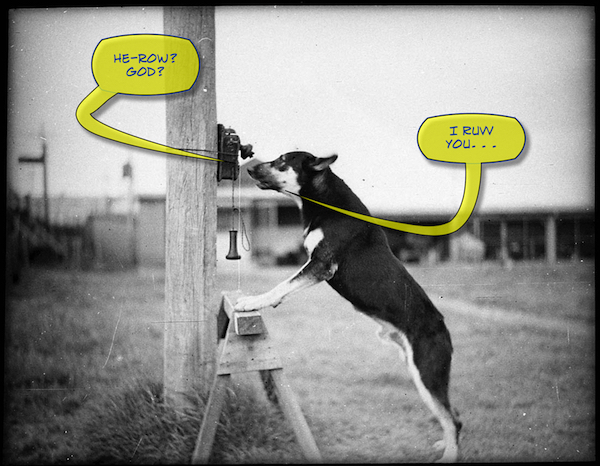How Simple Little Skits & Plays Can Become a Powerful Tool for Faith Communities
by Daniel D. Maurer, FunChurchPlays.com Founder
Before I was a pastor, I was a seminary student. (I know, right? Duh.) The denomination I belonged to (ELCA, but I grew up in the United Methodist Church) required every student to complete one year of internship. Generally, students have little say where they end up. I got sent to western North Dakota.
Bismarck may be considered by most to be the hinterland of hinterlands. For me, it was a destination I was pretty excited about—I loved the outdoors and believe it or not, North Dakota sports an austere beauty unlike any other landscape in the country. Plus, the state is filled with the best of folks—really salt o' the earth. What's more, the church I was assigned to was top notch. Two of the pastors serving there knew the ropes around ministry. To sweeten the deal, they were open to trying new things within worship to share the message.
For them (both pastors had the title of "supervisor" for my internship—a point of which I'm intensely proud . . . I needed two supervisors to keep tabs on me), trying out new and unique resources or strategies for sharing the Gospel meant being open to new ideas.
I remember when I came to them about an idea for our mid-week, Lenten worship services: I said, "Why don't we try out doing mini-plays or skits . . . you know . . . drama for the sermon . . . instead of just preachin' some dry message?"
Their immediate reaction was laughter. But they didn't find the idea itself ridiculous. No, they were open to that. What made them laugh was my description of a sermon! Some dry message.
Not as Scary as You Might Think
"Wachoo sayin', Dan?!" Source: Giphy
They took to the idea like James LeBron shooting an easy layup. In fact, implementing the skits into our service was actually quite easy. Fun, too!
Just because the plays were fun didn't mean we didn't tackle some tough theological issues. Truth be told, I think some of the topics made some of our folks uneasy. But because we had presented it such a way that was laid-back, and easy to digest (drama's like that, you know), the series ended up being a smash hit.
If memory serves me right, I think they continued the tradition of writing and using little skits in worship during that wonderful six-week period before Easter called Lent. Drama just works.
I've written about this topic before, about how story engages the human brain unlike any other media. The idea that bubbled up for this wonderful little blog post is how easy it was to implement church skits, plays, dialogues and monologues into a worship service.
How did I do it? I sat down, took 3-4 hours and cranked out a little skit. Now, I WISH—oh how I wish—there would have been a resource like this website back in that day! Because if there had been, I could have found the work I needed from a site I trusted and simply used it! I could even have gotten a bundle and picked which one to use to fit a particular text or theme.
Below are some points you should know about using a resource like drama or theater within your Sunday morning, mid-week, or even for Sunday School or Youth Groups.
Print it Up and Forget About Memorizing Lines
I think this one's the biggest deal. Here's the thing: you don't have to make your production Broadway quality to work!
Sure, props are nice. Sure, it's great if we could all get Shakespearean-level players to make our theater POP. Sure, it'd be great if everyone had the time to memorize lines.
But you don't need to.
When we performed (it's okay—you can say you "perform" things in church) the skit or play, we wouldn't memorize lines. Whatever props we had, we usually found 1/2 hour before worship! And the biggie?
WE PRINTED OUT OUR LINES AND SIMPLY READ THROUGH THEM.
The point I'm making is that to make theater work, you just have to tell the story. People will go along with it! Theater. Just. Works. (I know. I'm a stuck record.)
Theater Can be a Pastoral Vehicle Through Which to Teach the Faith!
Later in my experience as a pastor, I noticed that using skits and larger theatrical productions in confirmation class and youth groups really got the kids going. Also, in the third parish I served, we used mini-skits right before Sunday School to teach the theme for the day.
The amazing thing about drama is that it engages both the players and the viewers. It does this through story! Human beings are naturally drawn to stories and we learn inductively through hearing or through acting out the story itself!
For me, it was a no-brainer: If I wanted kids to know (really understand) a certain concept, I used acting and theater to get it done.
What's more, adults go crazy over watching their kids perform something—anyone who's ever been to a school play only has to look at the number of smart phones parents and grandparents are holding up to capture little Drew or Monica "onstage."
Drama: Intergenerational Gold
At Arches 'n Bells, we pride ourselves in offering worship resources that work for various ages. Some work better with adults. Others, with kids. Here's the thing: when you get kids, teens, young adults, adults, and grandparents all together—either as folks watching, or as active players—you'll see the faith juice starting to flow in people's minds and hearts!
Great skits and plays in church don't have to be perfect to work, either! In fact, even funny screwups can set people at ease more than you realize. Learning to use great church drama resources first begins with quality scripts. That's why at AnB, we want to offer grace-centered, easy-to-use (but challenging, also) theater, litanies and monologues with the most talented and creative playwrights as our writers.
And we're always looking for new writers with fresh talent, too. Much more is in the works! Take a gander and see what we have for you, right now. Click on the goofy little (big one, actually) button below. I promise, you'll enjoy looking through our ever-growing collection of skits, plays, reader's theater, and other dramatic resources for your progressive faith community!



